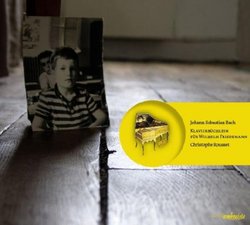| All Artists: Johann Sebastian Bach, Gottfried Heinrich Stolzel, Georg Philipp Telemann, Johann Christian Richter, Christophe Rousset Title: Johann Sebastian Bach: Klavierbüchlein für Wilhelm Friedemann Members Wishing: 1 Total Copies: 0 Label: Ambroisie Original Release Date: 1/1/2005 Re-Release Date: 10/11/2005 Album Type: Import Genre: Classical Styles: Ballets & Dances, Baroque Dance Suites, Chamber Music, Forms & Genres, Suites, Symphonies, Historical Periods, Baroque (c.1600-1750), Classical (c.1770-1830), Instruments, Keyboard Number of Discs: 2 SwapaCD Credits: 2 UPC: 3760020170776 |
Search - Johann Sebastian Bach, Gottfried Heinrich Stolzel, Georg Philipp Telemann :: Johann Sebastian Bach: Klavierbüchlein für Wilhelm Friedemann
 | Johann Sebastian Bach, Gottfried Heinrich Stolzel, Georg Philipp Telemann Johann Sebastian Bach: Klavierbüchlein für Wilhelm Friedemann Genre: Classical
|
Larger Image |
CD Details |
CD ReviewsA Revelation in Harpsichord Sound J. F. Laurson | Washington, DC United States | 06/20/2008 (5 out of 5 stars) "From his early harpsichord-playing days to conducting Les Talens Lyriques, Christophe Rousset is one of the more exciting figures working in Baroque music. And back at the harpsichord he is - after stints with almost every important record label (Virgin/EMI, L'Oiseau-Lyre/Decca, Naïve, Harmonia Mundi) - he now records one set of Bach works after another for Ambroise. I have passed by his English and French suites, unsure if doubling up in that repertoire would be worth the somewhat hefty price tag on these luxuriously presented double-disc sets. Now I've come into possession of his Clavierbüchlein für Wilhelm Friedemann... and I cannot stop listening to it. His Rosette-winning Decca recording of the Italian Concerto may have much acclaim and it is very fine, indeed... but it does not have that "Wow!" effect. This recording does - and instantly so.
From the first notes of the familiar Praeludium 1, BWV 846a (the name may not be familiar, but you will recognize it if you've ever played piano even at the most rudimentary level) on you are drawn in by one of the richest, cleanest, and enchanting harpsichord sounds I've heard on disc. I cannot imagine anyone so immune or disinclined towards that instrument (tiring as it can sound at times - especially in large quantities) that they would not at least admit that the sound is simply gorgeous. Chritophe Rousset's instrument, a Johannes Ruckers from 1632/1745, restored in 1787, just blooms while retaining such precision that every single note could be followed. The Klavierbüchlein is the first set of keyboard instructions of Bach's for his eldest son's ninth birthday. It contains a handful of works by composers other than Bach, too, including Telemann and Stölzel. (The other sets, in order of increasing difficulty, are the Two-Part Inventions, Three-Part Sinfonias, WTC (of which one can hear the first ideas in these works) and finally the Trio Sonatas for organ.) The works here may be composed for a nine-year-old and they may be relatively simple... but they are Bach, full of beauty and anyone should want to be able to play them like Rousset. Only listening to them all too many times in a row will bring out the fact that they are, ultimately, inferior to any of Bach's suites, for example. Still, many recordings can delight harpsichord devotees - few can convert those who find the harpsichord's pleasures to be dubious ones- and this one should do the trick. The only ones that may not find this completely convincing are those who wish their German Baroque played as straight and rhythmically steady as possible. Rousset gives the music a Romantic tension, a painful magnificence, by pulling the tempi a little, by indulging us with rubato. For me that makes the recording as vivid as I had hitherto not been able to imagine these works played - a revelation along the lines of Alessandrini's Four Seasons with Concerto Italiano." |

 Track Listings (31) - Disc #1
Track Listings (31) - Disc #1